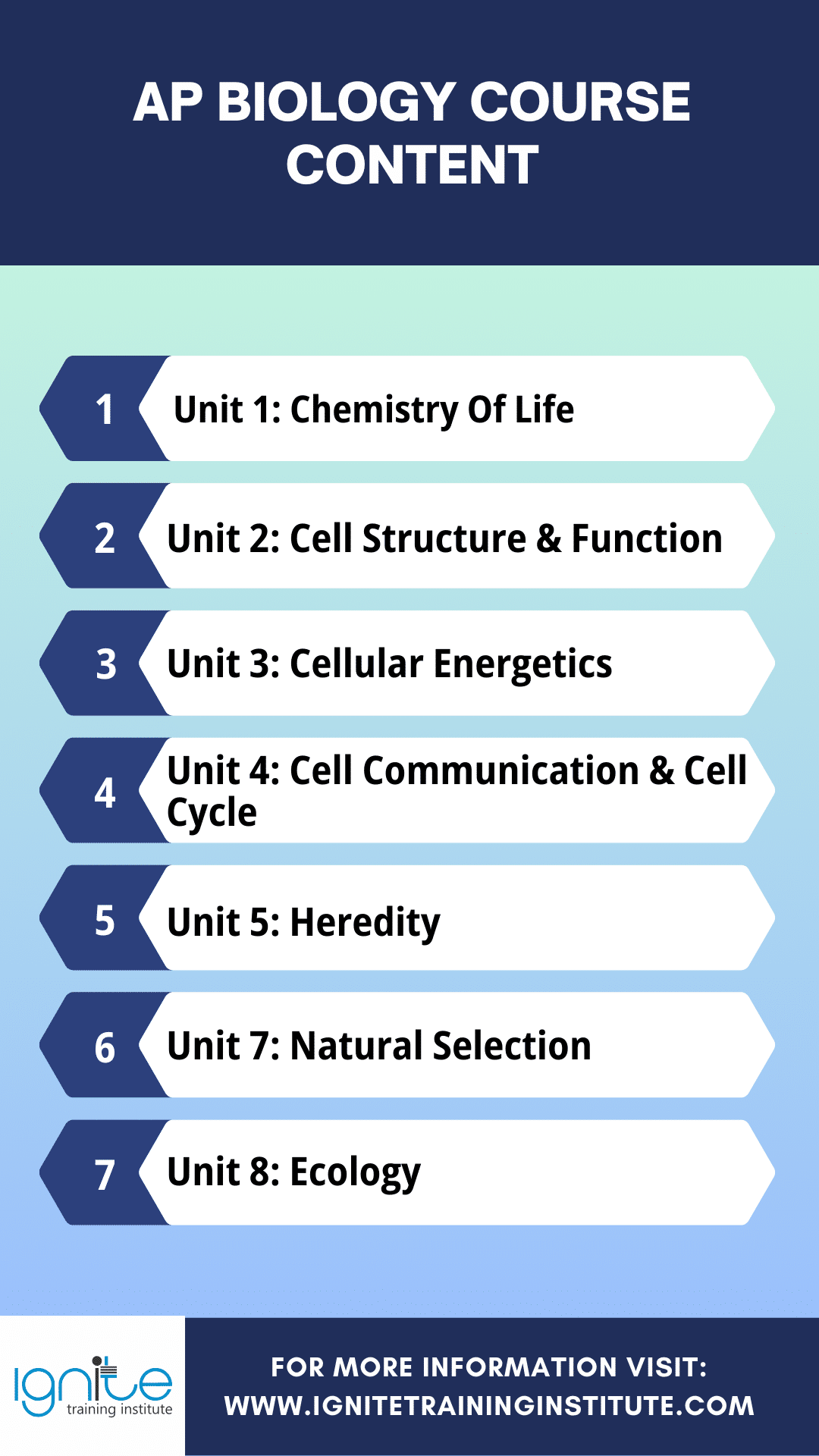Delving into the intricate world of biology, Advanced Placement Biology (AP Biology) stands as a beacon of academic rigor and exploration for high school students. It offers a comprehensive study of life sciences, encompassing topics ranging from cellular biology to ecology and genetics. As students navigate this challenging course, having the right support and guidance is paramount.
That’s where Ignite Training Institute steps in. Our specialized tutoring support for AP Biology ensures that students receive personalized assistance, honing their understanding of complex concepts and enhancing their exam preparation strategies. Join us at Ignite Training Institute and unlock your potential in AP Biology.
What Is AP Biology?
AP Biology is an advanced placement course that delves into the intricate world of biology at a college level, providing high school students with a comprehensive understanding of the subject. It covers a broad spectrum of topics ranging from cellular biology and molecular genetics to ecology and evolution.
The course emphasizes inquiry-based learning, critical thinking, and scientific inquiry, preparing students for further study in biological sciences or related fields at the college level. AP Biology culminates in a comprehensive exam that assesses students’ understanding of biological concepts and their ability to apply scientific principles and methodologies.
Successful completion of AP Biology not only earns students valuable college credit but also equips them with a deeper appreciation and comprehension of the natural world and its complexities. AP Biology offers students a rigorous and rewarding educational experience, fostering a deeper understanding of the natural world and the principles that govern life processes.
Related: What Is AP Chemistry Exam? A Student’s Guide To Prepare
AP Biology Course Content & Its Leverage On The Exams

The AP Biology course content encompasses various units, each crucial for comprehending biological systems. Here’s how each unit leverages exam success:
Unit 1: Chemistry Of Life
Understanding water’s role and macromolecules lays the foundation for comprehending cellular processes, crucial for multiple-choice questions and experimental design scenarios.
Unit 2: Cell Structure & Function
Mastery of cell composition and evolution basics aids in answering questions related to cell biology, including those assessing cellular structure and function.
Unit 3: Cellular Energetics
Exploring cellular interactions and fundamental processes enhances problem-solving skills, vital for tackling questions related to energy flow and metabolic pathways.
Unit 4: Cell Communication & Cell Cycle
Knowledge of cell growth, reproduction, and signaling mechanisms prepares students for questions on cell division, signal transduction, and regulatory processes.
Unit 5: Heredity
Understanding the principles of genetics enables students to tackle questions on inheritance patterns, genetic variation, and genetic disorders.
Unit 6: Gene Expression & Regulation
Studying heredity and gene expression equips students to address questions on molecular genetics, gene regulation, and biotechnology applications.
Unit 7: Natural Selection
Learning about evolution and natural selection provides the framework for understanding biodiversity, adaptation, and evolutionary relationships, crucial for evolutionary biology questions.
Unit 8: Ecology
Analyzing ecological concepts and population dynamics aids in answering questions related to ecosystem interactions, community structure, and environmental impacts, essential for ecology and environmental science inquiries.
Related: AP Exam Test Dates 2024: A Student’s Guide To Strategize
AP Biology Exam Structure
The AP Biology exam is structured into two main sections, each contributing equally to students’ overall scores. Here’s an overview of the exam format:
1. Section I: Multiple Choice
- Duration: 1 hour 30 minutes
- Questions: 60
- Weight: 50% of total score
- Description: This section comprises 60 multiple-choice questions, designed to assess students’ understanding of a wide range of biological concepts covered in the course. Students have 1 hour and 30 minutes to complete this section, with each correct answer contributing to their overall score.
2. Section II: Free Response
- Duration: 1 hour 30 minutes
- Questions: 6
- Weight: 50% of total score
- Description: In this section, students tackle 6 free-response questions that assess their ability to apply biological knowledge, design experiments, analyze data, and construct coherent arguments. With 1 hour and 30 minutes allocated, this section carries equal weight to the multiple-choice section in determining students’ overall scores.
Related: AP Exam Test Dates 2024: A Student’s Guide To Strategize
When Is The Next AP Biology Exam?
The upcoming AP Biology exam is scheduled for Monday, May 4, 2026, at 8 a.m. local time. For students taking the late test, the exam will be held on Wednesday, May 20, 2026.
It marks an opportunity for students to demonstrate their proficiency and potentially earn college credit, showcasing their readiness for further studies in biology-related fields.
Related: AP Courses: Pick Subjects For Engineering, Business, & Others
Is Achieving A good Score In AP Biology Hard?
Many students wonder about the difficulty of achieving a good score in AP Biology. Let’s break it down:
- Content Depth: AP Biology covers a vast array of biological concepts, requiring a deep understanding of topics ranging from cellular processes to ecological systems.
- Critical Thinking: Success in AP Biology demands strong critical thinking skills to analyze experimental data, interpret complex biological phenomena, and apply knowledge to novel situations.
- Time Commitment: Excelling in AP Biology often necessitates significant time investment for studying, completing assignments, and engaging in laboratory work to grasp intricate concepts thoroughly.
- Exam Rigor: The AP Biology Exam rigorously assesses students’ comprehension, requiring them to apply knowledge through multiple-choice questions and free-response tasks, challenging both breadth and depth of understanding.
- Preparation Resources: Access to quality study materials, practice exams, and effective study strategies can significantly impact one’s ability to achieve a good score, making adequate preparation essential for success.
A good AP Biology score typically falls within the range of 3 to 5. The AP Biology exam is scored on a scale of 1 to 5, with 5 being the highest score and 3 considered passing. Achieving a score of 4 or 5 indicates a strong understanding of the course material and may earn students college credit or advanced placement in biology-related courses at many colleges and universities.
Related: Top 5 Easiest AP Exams: A Guide to Achieving Success
Should You Choose AP Biology?
Choosing whether to take AP Biology depends on various factors, including your academic interests, career goals, and willingness to challenge yourself. AP Biology offers a comprehensive exploration of biological concepts, providing a solid foundation for further study in life sciences or related fields.
By taking AP Biology, students have the opportunity to delve deeper into topics such as genetics, ecology, and physiology, gaining valuable knowledge and critical thinking skills that are highly relevant in today’s scientific landscape.
Additionally, succeeding in AP Biology can demonstrate to colleges and universities your proficiency in a rigorous academic subject, potentially earning you college credit and placement in advanced courses. Ultimately, if you have a passion for biology and are eager to engage in a challenging and rewarding educational experience, AP Biology may be the right choice for you.
Related: Do AP Classes Count As College Credit? All You Need To Know
Ignite Training Institute – Tutoring Support For AP Biology
Ignite Training Institute offers specialized tutoring support for students preparing for AP Biology. Our experienced tutors are dedicated to providing personalized guidance and support to help students excel in this challenging course.
Whether you’re struggling with complex concepts like cellular respiration or need assistance with exam preparation strategies, our tutors are here to help. With a focus on fostering a deep understanding of biological principles and honing critical thinking skills, Ignite Training Institute equips students with the knowledge and confidence they need to succeed in AP Biology and beyond. Join us and ignite your passion for biology today!
Related: A Complete Guide To What Is An AP Seminar Exam
FAQs
1. What Does AP Stand For In Biology?
AP stands for Advanced Placement in Biology.
2. Is AP Biology That Hard?
AP Biology can be challenging due to its comprehensive coverage of biological concepts and rigorous examination format, but with dedication and effective study strategies, students can successfully navigate the course.
3. What Topics Are In AP Biology?
AP Biology covers topics such as cellular structure, genetics, evolution, ecology, and biochemistry.
Conclusion

Advanced Placement Biology (AP Biology) offers students a captivating journey into the fascinating world of life sciences. Throughout this challenging course, students delve deep into the complexities of biology, exploring everything from cellular processes to ecological systems. With dedication, perseverance, and the right support, students can unlock their potential and excel in AP Biology.
Whether aiming for college credit, advanced placement, or simply a deeper understanding of the natural world, the knowledge and skills gained from AP Biology are invaluable. Embrace the adventure, ignite your passion for biology, and embark on a journey of discovery with AP Biology.
Related: The Difficulty of AP Exams & Classes: What to Expect


